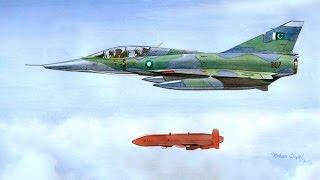Does Pakistan Qualify as "Too Big to Fail"?
The phrase "too big to fail" has gained currency in the United States to describe large and troubled financial institutions since the beginning of the banking crisis last year. The characteristics of such institutions include their large size and huge impact on the rest of the US banking system and the global economy at large.

Seen in the context of regional and global geopolitics, are there any parallels between the the large US banks and the Pakistani state? Let's examine this proposition in a little more depth.
Large Size:
In terms of its size, Pakistan is one of the largest countries in the world. With population exceeding 170 million, it is one of only eight nations armed with nuclear weapons. The nation ranks as sixth largest in population, seventh largest in its army size, 8th in number of mobile phone users, 10th in educated English speaking population, 10th in labor force size, 17th largest in number of Internet users, 26th in economy and 34th in land area.
Strategic Location:
Pakistan sits at the entrance to the oil rich Persian Gulf, and it shares borders with Afghanistan, Iran and the world's most population nuclear states of China and India. Pakistan's Gwadar port is only 180 nautical miles from the exit of the Straits of Hormuz, considered extremely important for the flow of the bulk of world's demand for oil transportation from the Gulf nations. It provides convenient access to sea routes for many of the landlocked mineral-rich Central Asian states and Western China.
Pakistan has a 650-mile long coastline on the Arabian Sea, extending from India to Iran. In addition, some of the air routes between west and east pass through Pakistan because of its central location. Karachi and Gawadar have natural harbor ports serving as trading and re-fueling stop for ships.
Major Failures:
Not unlike the troubled US banks facing the prospect of certain failure, Pakistan also shows up at number 10 on the failed state index compiled by Fund for Peace and Foreign Policy magazine in 2008. However, in spite of the disastrous political leadership and extremely poor governance, the country’s saving grace is arguably its people. As the consequences sink in among Pakistan’s secular elite of the rising Taliban, there are signs that the country’s educated middle class – in Islamabad, Lahore and Karachi, cities rocked recently by continuing terrorist attacks – is losing its patience with radicalism. The urban middle class has more clout than many analysts think. It constitutes the backbone of the army, the business and professional classes and the opinion makers in the media. And the middle class is getting serious about its responsibility. They have now compelled the government into taking more decisive action.
Anger and Distrust:
Just like the US bankers who are getting bailed out at US taxpayers' expense, Pakistanis do not trust Uncle Sam, either. But, in spite of the widespread and deep distrust of the United States, the latest polls now indicate that 86 percent of Pakistanis agree that Taliban and Al-Qaeda militants pose a problem for Pakistan and more than two-thirds support a recent Pakistani army offensive against the extremists. Just as many US taxpayers are unhappy with the massive bailout of the US financial services, there is popular opposition to bailing out many troubled nations around the world. Just as people say that US bankers should have to pay for their own failures, there is a strong feeling that nations who have misbehaved should be made to pay for their mistakes.
Consequences of Failure:
The fear of contagion triggering national and global economic collapse was the chief reason why the US acted swiftly and decisively to prop up the failing financial institutions on Wall Street last year. The same "contagion" logic applies to Pakistan's potential failure which can lead to catastrophic consequences for Asia, the Middle East and the rest of the world, and seriously hurt American economy and strategic interests. If a nuclear-armed nation of 170 million people with a large military falls, then the millions of Pakistanis armed and trained to fight could spread out into the neighboring nations and beyond. This could be highly destabilizing and extremely dangerous for the global peace and prosperity.
Rewards of Success:
If Pakistanis, Americans, Europeans and the world make a commitment and do succeed in helping to bring peace and stability to Pakistan, then there can be an expectation of a significant upside for all. A peaceful, stable, and prosperous Pakistan has a lot to offer in terms of a large, well-educated, English speaking work force, a huge market opportunity for all sorts of products and services, and tremendous potential for global economic growth.
There is no guarantee of success if the world does make a serious commitment and starts making a long term investment in helping Pakistan, but failure is definitely not an option.
Here are two video clips about Pakistan:
Related Links:
Pakistan's Foreign Visitors Pleasantly Surprised
Start-ups Drive a Boom in Pakistan
Pakistan Conducting Research in Antarctica
Pakistan's Multi-billion Dollar IT Industry
Pakistan's Telecom Boom
ITU Internet Data
NEDUET Progress Report 2008
Pakistani Entrepreneurs in Silicon Valley
Musharraf's Economic Legacy
Should Pakistanis be Proud of Their Country?
Pakistan's International Rankings
Assessing Pakistan Army Capabilities
Pakistanis See US as Biggest Threat
Pakistan is not Falling
Fear, Greed and Bailout on Wall Street
Jinnah's Pakistan Booms Amidst Doom and Gloom

Seen in the context of regional and global geopolitics, are there any parallels between the the large US banks and the Pakistani state? Let's examine this proposition in a little more depth.
Large Size:
In terms of its size, Pakistan is one of the largest countries in the world. With population exceeding 170 million, it is one of only eight nations armed with nuclear weapons. The nation ranks as sixth largest in population, seventh largest in its army size, 8th in number of mobile phone users, 10th in educated English speaking population, 10th in labor force size, 17th largest in number of Internet users, 26th in economy and 34th in land area.
Strategic Location:
Pakistan sits at the entrance to the oil rich Persian Gulf, and it shares borders with Afghanistan, Iran and the world's most population nuclear states of China and India. Pakistan's Gwadar port is only 180 nautical miles from the exit of the Straits of Hormuz, considered extremely important for the flow of the bulk of world's demand for oil transportation from the Gulf nations. It provides convenient access to sea routes for many of the landlocked mineral-rich Central Asian states and Western China.
Pakistan has a 650-mile long coastline on the Arabian Sea, extending from India to Iran. In addition, some of the air routes between west and east pass through Pakistan because of its central location. Karachi and Gawadar have natural harbor ports serving as trading and re-fueling stop for ships.
Major Failures:
Not unlike the troubled US banks facing the prospect of certain failure, Pakistan also shows up at number 10 on the failed state index compiled by Fund for Peace and Foreign Policy magazine in 2008. However, in spite of the disastrous political leadership and extremely poor governance, the country’s saving grace is arguably its people. As the consequences sink in among Pakistan’s secular elite of the rising Taliban, there are signs that the country’s educated middle class – in Islamabad, Lahore and Karachi, cities rocked recently by continuing terrorist attacks – is losing its patience with radicalism. The urban middle class has more clout than many analysts think. It constitutes the backbone of the army, the business and professional classes and the opinion makers in the media. And the middle class is getting serious about its responsibility. They have now compelled the government into taking more decisive action.
Anger and Distrust:
Just like the US bankers who are getting bailed out at US taxpayers' expense, Pakistanis do not trust Uncle Sam, either. But, in spite of the widespread and deep distrust of the United States, the latest polls now indicate that 86 percent of Pakistanis agree that Taliban and Al-Qaeda militants pose a problem for Pakistan and more than two-thirds support a recent Pakistani army offensive against the extremists. Just as many US taxpayers are unhappy with the massive bailout of the US financial services, there is popular opposition to bailing out many troubled nations around the world. Just as people say that US bankers should have to pay for their own failures, there is a strong feeling that nations who have misbehaved should be made to pay for their mistakes.
Consequences of Failure:
The fear of contagion triggering national and global economic collapse was the chief reason why the US acted swiftly and decisively to prop up the failing financial institutions on Wall Street last year. The same "contagion" logic applies to Pakistan's potential failure which can lead to catastrophic consequences for Asia, the Middle East and the rest of the world, and seriously hurt American economy and strategic interests. If a nuclear-armed nation of 170 million people with a large military falls, then the millions of Pakistanis armed and trained to fight could spread out into the neighboring nations and beyond. This could be highly destabilizing and extremely dangerous for the global peace and prosperity.
Rewards of Success:
If Pakistanis, Americans, Europeans and the world make a commitment and do succeed in helping to bring peace and stability to Pakistan, then there can be an expectation of a significant upside for all. A peaceful, stable, and prosperous Pakistan has a lot to offer in terms of a large, well-educated, English speaking work force, a huge market opportunity for all sorts of products and services, and tremendous potential for global economic growth.
There is no guarantee of success if the world does make a serious commitment and starts making a long term investment in helping Pakistan, but failure is definitely not an option.
Here are two video clips about Pakistan:
Related Links:
Pakistan's Foreign Visitors Pleasantly Surprised
Start-ups Drive a Boom in Pakistan
Pakistan Conducting Research in Antarctica
Pakistan's Multi-billion Dollar IT Industry
Pakistan's Telecom Boom
ITU Internet Data
NEDUET Progress Report 2008
Pakistani Entrepreneurs in Silicon Valley
Musharraf's Economic Legacy
Should Pakistanis be Proud of Their Country?
Pakistan's International Rankings
Assessing Pakistan Army Capabilities
Pakistanis See US as Biggest Threat
Pakistan is not Falling
Fear, Greed and Bailout on Wall Street
Jinnah's Pakistan Booms Amidst Doom and Gloom



Comments
ISLAMABAD: Chinese investment in the Gwadar Port is purely economic, said Hu Xijin Editor-in-Chief of the Global Times on Wednesday. Speaking at a roundtable organised by the Institute of Regional Studies (IRS) on Pak-China relations with the editorial staff of Global Times he siad China would make all the necessary investments in the Port to make it fully operational to support Chinese trade with West Asia, especially the trade between western part of China and that part of the world. China considers Pakistan an important friendly neighboring country and Chinese investors want to invest in projects in Pakistan. Some Chinese investors are apprehensive about the security situation in Pakistan. He said China would keep supporting the reconstruction of Afghanistan post-2014. China does not want to undertake projects in any country that are opposed by the host communities. Responding to a question about the imbalance in trade of China with Pakistan, Hu said China was a free market economy where the government could not dictate to the companies to import products from other countries if they were not market competitive. Ashraf Azim President of IRS pointed out Indian concerns about the use of Gwadar Port, as a naval base was completely baseless.
http://www.dailytimes.com.pk/default.asp?page=2013\02\21\story_21-2-2013_pg5_13
The World Bank data also shows that Pakistan's economy is now the 23rd largest in the world in terms of PPP, up from 26th largest in 2008.
http://data.worldbank.org/indicator/NY.GDP.MKTP.PP.CD/countries/order%3Dwbapi_data_value_2012%20wbapi_data_value%20wbapi_data_value-last?order=wbapi_data_value_2012%20wbapi_data_value%20wbapi_data_value-last&sort=desc&display=default
http://www.riazhaq.com/2009/11/is-pakistan-too-big-to-fail.html
By Shekhar Gupta
https://youtu.be/NuXd4d_clf4
The US ambassador visits Pakistan occupied Kashmir & refers to it as ‘Azad Jammu & Kashmir’, German foreign minister says UN could play a role in Kashmir & Pakistan’s Army Chief spends nearly a week in Washington. In episode 1093 of Cut The Clutter Shekhar Gupta explains why Pakistan cannot be isolated or ignored and where it stands right now.
-----------------
Pakistan is our most important neighbor
We must focus on Pakistan
We can not ignore Pakistan in India because the world can not ignore Pakistan
The Western world has an intrinsic relationship with Pakistan which doesn't go away
The West does not see Pakistan as so useful to them today and yet Pakistan can not be isolated
You can see all the indications that Pakistan is not isolated
A lot of (Indian) TV channels say Pakistan is isolated but the evidence doesn;t support it
Pakistan FM has visited Washington and met his counterpart Tony Blinken
Pakistan Army Chief has received a warm welcome at the US Defense Dept and met US Defense Secretary Lloyd Austin. Bajwa matters more than the Pakistan Defense Minister. Nobody knows his name.
US Ambassador to Pakistan Donald Blome, a career diplomat has visited Pakistan Occupied Kashmir and called it Azad Kashmir...Azad means free.
When the chips are down in the region Pakistan is the ally Americans reach out to
The US does not want Pakistan to drift to China
German foreign minister Annalena Baerbock has spoken about Kashmir...the K word. She has asked for the UN to help solve the Kashmir issue.
Bajwa is not a warmonger. He wants to normalize ties with India. He wants to trade with India. He doesn't want Faiz Hameed to succeed him. He used to be the ISI chief and took credit for the Taliban victory in Afghanistan. Do the Americans have leverage here?
Where does Pakistan's unique power come from? Why can't Pakistan be ignored? Why can't Pakistan be isolated?
The Indian public needs to understand it.
Pakistan is too big in terms of population, too powerful militarily, too Muslim, too nuclear and too well located to be isolated.
Pakistan has the 5th largest population and its population is growing fast. It could soon exceed Indonesia to become the largest Muslim nation in the world.
Pakistan has the 5th strongest military in the world.
In terms of nuclear weapons, Pakistan has the 4th largest nuclear arsenal in the world.
Pakistan is too well located to be isolated. It has geo-strategic location. Pakistan is the western gateway to China. Pakistan opened China's ties with US. And then helped the US defeat the Soviet Union.
The factors that made Pakistan such a strong ally to US still exist. Don't blame the Pakistanis for it.
India is not willing to be commit to an alliance with the US.
Imran Khan tried to change Pakistan's foreign policy to be more like India's but he failed.